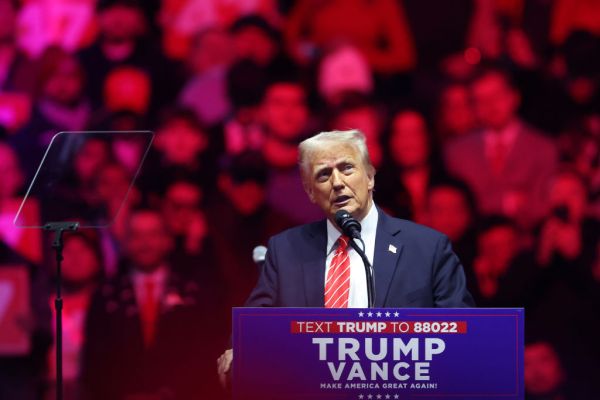Hello and happy Thursday! On this date in 1958, the United States and Canada agreed on the creation of the North American Air Defense Command, eventually becoming the North American Aerospace Defense Command (NORAD). Interesting fact: NORAD’s alternate command center is built into Cheyenne Mountain in Colorado, and includes 15 buildings inside the mountain—one mile from the facility entrance and 2,000 feet below the mountain’s peak.
Interestingly, it was in a similar facility where Steve Hayes provided my first indoctrination “lesson” after joining The Dispatch. Between sessions of being waterboarded with Spanish wine while he yelled, “WE DON’T DRINK MERLOT,” Steve also explained that a big part of what we want to do at The Dispatch is to introduce and explain topics that are important, but perhaps not familiar. This newsletter discusses one such topic—the national security risks of some American foreign direct investment (FDI), also called “outbound investment.”
When we talk about outbound investment, we’re discussing U.S. direct investment outside of our own country. According to the Bureau of Economic Analysis at the Department of Commerce, American FDI amounted to $6.15 trillion in 2020, up $244.9 billion over the previous year (the 2021 numbers don’t come out until July). Nearly $124 billion of this funding went to China, with $2.5 billion in U.S. venture capital going to the Chinese technology industry. And this is where the national security concerns come in.
We’ve previously talked at length about how technology plays a role in U.S. and Chinese ambitions and how it is at the heart of Washington’s and Beijing’s current economic, social, and political confrontation. But let me make the problem more tangible with a specific example.
Sequoia Capital is an U.S. venture capital firm headquartered in Menlo Park, California, but with regional offices around the world, including its Asia office in Beijing. By every metric you can imagine, Sequoia is an amazing story of American innovation and capitalism, with successful investments in Apple, Cisco, Google, LinkedIn, WhatsApp, PayPal, Reddit, Instagram, and Tumblr. Many of its companies are doing amazing things and are even helping the Pentagon to develop and to apply cutting-edge technologies. But—and this is a very big “but”—some of its investments are also in companies that are helping the Chinese military to develop and to field technologies that will directly threaten U.S. personnel and interests. 4Paradigm is one such company.
4Paradigm is one of China’s leading artificial intelligence (AI) companies and specializes in applying AI across large enterprises. The company is currently helping the Chinese military deploy its Sage HyperCycle capability, a “automatic decision-making machine learning platform.” The Chinese navy, as just one example, is thought to be using this platform for combat tasking and “intelligent loss management.” Put simply: If the United States were to go to war with China, this software suite would likely be used by the Chinese to kill our sailors and to defeat our ships. Sequoia is the company’s largest foreign investor, and this is only one of the problematic investments.
To be clear, Sequoia is far from the only U.S. firm engaged in such investments. In fact, many U.S. banks and tech companies have dedicated investment funds that make similar bets and, when you speak with these groups, they often offer similar defenses. They’ll argue that these problematic investments are only a fraction of their total portfolio. They’ll say their investment is in a technology with broad private sector application and that it’s unfair to hold them responsible for how the Chinese government uses it. Or they’ll counter that, if American money is cut off from these companies, it will simply be replaced by Chinese or other investors, degrading U.S. wealth and influence with little to show for it. Occasionally, firms will explain that their China investments are made by legally separate entities (though they often share the same name and administrative resources) using only non-U.S. funds and that there’s not much they can do to stop them. I don’t find any of these arguments to be compelling.
First, it doesn’t matter what percentage of an investment portfolio is helping America’s rivals and helping the United States military doesn’t offset this aid. Imagine finding a soldier who was helping an enemy target his own forces and his defense was, “But I only did it once, and I’ve helped you too!” Not very persuasive. Second, we can and should hold companies accountable when they knowingly and materially improve our rivals’ ability to kill Americans. Maybe investors didn’t originally predict their money would support such efforts, but there’s no excuse once these facts are known. Naivete isn’t illegal, complicity should be. Third, I don’t care if someone else will fill the funding gap; it’s immoral and self-defeating for us to enrich ourselves by enabling the world’s largest human rights abuser and our chief geopolitical competitor. There’s also very little proof that this financial support buys influence over these organizations because, at the end of the day, venture funds don’t have armies and prisons—the Chinese Communist Party does. Finally, arcane arguments about the legal structure of investment entities try to obscure the fact that foreign-incorporated branches of U.S. firms clearly benefit from their American association, and that the American firm clearly receives help from its foreign subsidiary. Otherwise, neither entity would enter into these agreements in the first place. More to the point, if a U.S.-based investment firm cannot prevent its foreign branch from supplying the Chinese military, it’s time to cut off that branch.
Well then, some will argue, just make these investments illegal. We have. It is against the law to support anyone on the Department of Commerce’s Denied Persons List, the Unverified List, the Entity List, or the Military End User (MEU) List. Likewise for the Treasury Department’s Specially Designated Nationals List and Chinese Military-Industrial Complex Companies List. There are even more lists of banned companies, but new Chinese companies are not automatically added to these lists, and all of the lists suffer from not being able to scale enforcement to match the challenge. Even more, often all a Chinese company must do to evade these sanctions is legally change its name and then it’s back in the game. The quickest, most efficient way to handle this challenge would be for American investment entities to police themselves and some certainly are. But those investors who are holding out are causing the U.S. government to consider more aggressive action.
In 1975, President Gerald Ford established the Committee on Foreign Investment in the United States (CFIUS; pronounced “SIF-FEE-US”) to review foreign investments and acquisitions inside the United States for national security concerns. CFIUS got a soup-to-nuts modernization in 2018 and, while far from perfect, is an important and relatively effective tool for ferreting out national security risks associated with foreign money coming into the nation. There’s no formal equivalent, however, for money flowing in the opposite direction.
There are several legislative proposals being considered in Congress, including the National Critical Capabilities Defense Act, which, in addition to creating a government entity to review “supply chain security, domestic production and manufacturing capacities of identified National Critical Capabilities,” would also, “establish an outbound investment review which covers proposed offshoring of U.S. production, development, manufacturing, or fabrication of identified critical national capabilities for foreign adversaries, like China and Russia.” While there’s some talk about including this or similar provisions in the final so-called China competitiveness bill currently being negotiated by the House and Senate, there’s no telling if this language will make the final cut and you can bet that serious effort is being spent on preventing its inclusion. The executive branch isn’t doing much better.
Early on, the Biden administration made all the right noises when it came to confronting Chinese intellectual property theft and other espionage concerns. The need for some type of outbound investment review was frequently mentioned and described as a serious issue that needed to be addressed with all alacrity. But there’s been little progress. In fact, the administration, like the Trump administration before it, is divided.
National security officials like National Security Adviser Jake Sullivan have been pushing for months for an executive order that would constrain or stop U.S. FDI into Chinese tech companies, but senior leaders at the Commerce and Treasury departments are pushing back, saying this would hurt American business and disadvantage us with Asian and European investors who will stay active in Chinese markets. In fact, in a proven D.C. tactic of killing initiatives by studying them to death, Treasury has asked Congress not to restrict outbound investment but to instead launch a “pilot program” to gather more data on the issue. I’m all for data-driven legislation, but more data is not what this problem demands.
We know China is preparing to fight the United States “under high technology conditions.” We know that lapses “in diligence and situational awareness may permit the Chinese military and defense industry to access capital and technology originating in the United States and partner nations, including advanced computer chips.” And we know the following from the director of national intelligence’s report and public testimony:
China will remain the top threat to U.S. technological competitiveness as Beijing targets key sectors and proprietary commercial and military technology from U.S. and allied companies and institutions. Beijing uses a variety of tools, from public investment to espionage to advance its technological capabilities. Beijing’s willingness to use espionage, subsidies, and trade policy to give its firms a competitive advantage represents not just an ongoing challenge for the U.S. economy and its workers, but also advances Beijing’s ability to assume leadership of the world’s technological advancement and standards.
We don’t need more study. We need more action and maybe we’ll see some soon—which is why I’m bringing up this topic here.
I’ll close with three final thoughts.
First, I don’t think the U.S. investment community is devoid of patriots or rife with people who actively look to harm the nation or its people. I don’t think Sequoia is evil, but I do think it is culpable. I also believe many in the venture investment community are naïve or willfully blind to the implications of some of their investments. It’s easy to cite all the real goods that come from economic prosperity and participation in the Chinese market, but there are more fundamental goods that must be considered—and these include the security of our nation and of our citizens.
Second, I understand why a venture capital firm or bank doesn’t want to unilaterally withdraw from Chinese technology investments when others are willing to stay and to reap the rewards. This is a difficult position and one that arguably works against at least one understanding of a firm’s fiduciary responsibility to legally realize profits where it can. But China’s growing aggression cannot be ignored. The country is now a peer military competitor, or soon could be, and the United States government will be well within its constitutional duties when it stops American FDI in Chinese technology companies. Waiting for this blunt government action, however, almost ensures it will be more disruptive and costly than it could have been if investors had simply acted on their own.
Finally, third, even if we do establish some sort of outbound investment review committee, we’re still going to have the challenge of scaling enforcement. This means the U.S. government will not only need the investment community’s compliance, but also its cooperation. The ideal scenario would be one where government and industry share information and insights on how foreign governments and companies are gaming the system, stealing data and intellectual property, and otherwise distorting the global free market and imperiling American interests and people. This will not be easy and there are lots of good reasons to be skeptical of such cooperation. Nevertheless, it will be necessary.
At the end of the day, the U.S. government is asking American investors not to enrich or enable Chinese companies that are themselves enabling a hostile Chinese government. I understand how this can be a difficult request. I do not understand why some continue to refuse it.
That’s it for this edition of The Current. Be sure to comment on this post and to share this newsletter with your family, friends, and followers. You can also follow me on Twitter (@KlonKitchen). Thanks for taking the time and I’ll see you next week!








Please note that we at The Dispatch hold ourselves, our work, and our commenters to a higher standard than other places on the internet. We welcome comments that foster genuine debate or discussion—including comments critical of us or our work—but responses that include ad hominem attacks on fellow Dispatch members or are intended to stoke fear and anger may be moderated.
With your membership, you only have the ability to comment on The Morning Dispatch articles. Consider upgrading to join the conversation everywhere.